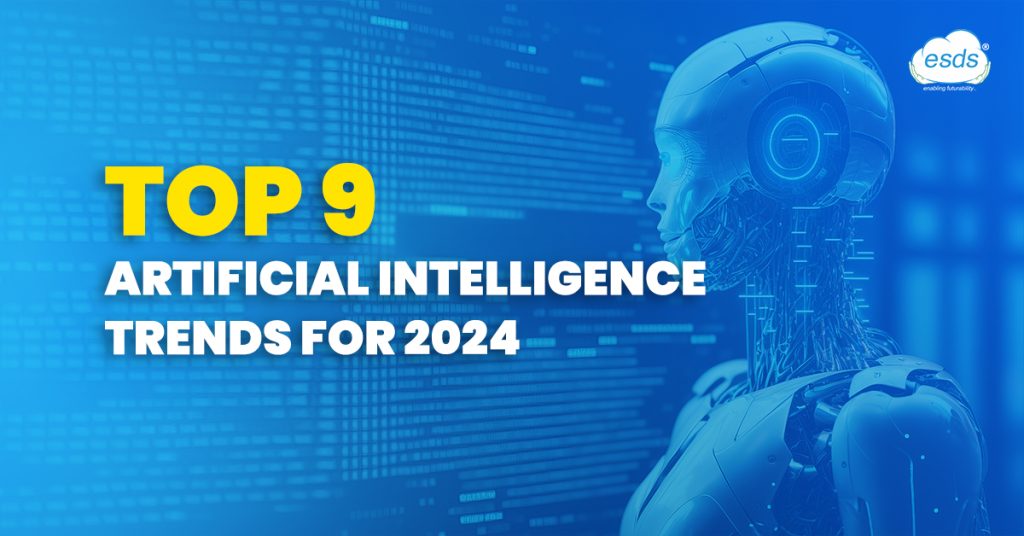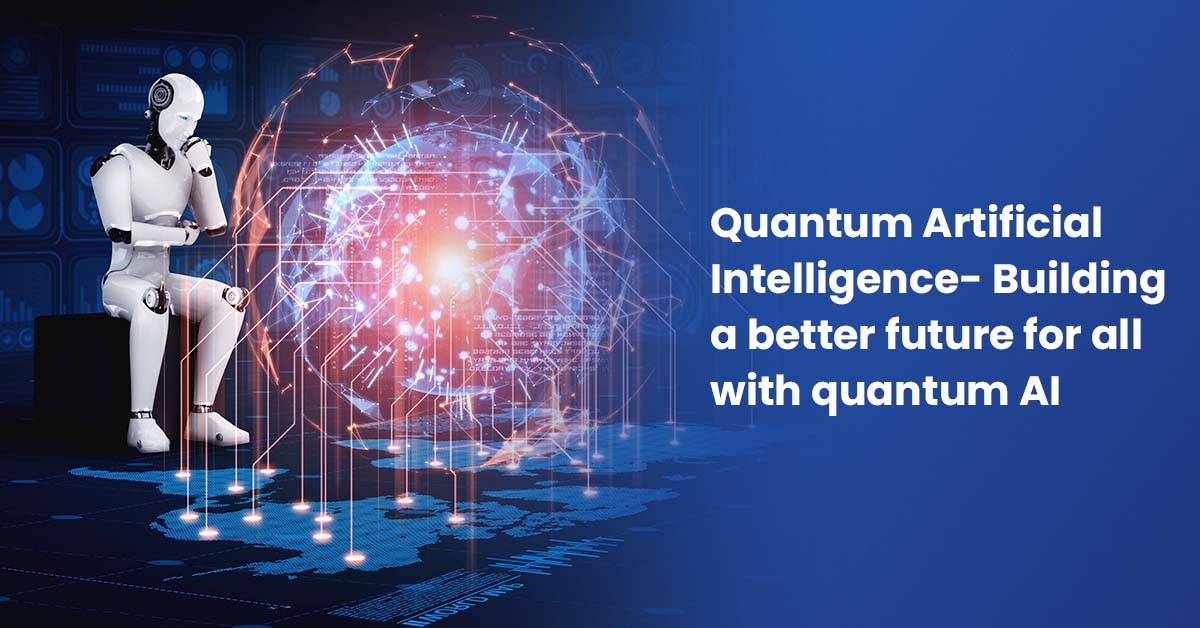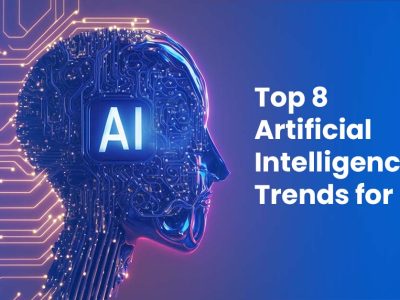Top 9 Artificial Intelligence Trends for 2024

In 2024, artificial intelligence (AI) and Artificial Intelligence Trends are poised to continue its transformative journey, weaving deeper into the fabric of our daily lives, impacting various industries, and driving regulatory changes. Also, Artificial Intelligence (AI) jobs have emerged as one of the fastest-growing sectors globally, which is no surprise considering the ongoing AI revolution. From small startups to Fortune 500 companies, organizations are actively harnessing AI’s potential to enhance their business operations. Moreover, integrating AI into daily life has seen a significant surge.
The widespread adoption of AI in various industries and its increasing presence in our daily lives are attracting substantial investments in the development of innovative AI solutions. As a result, the AI market is expanding, with projections by Markets and Markets indicating a potential value of $1345.2 billion by 2030, growing at an impressive CAGR of 36.8%.
With this increasing AI industry, students and young professionals should prepare for a multitude of job opportunities on the horizon. Staying updated with the latest AI trends in 2024 will be essential to chart a successful career path.
Let’s delve into these key trends in more detail.
1. Low-code and no-code Software Development

Low-code and no-code software development tools are becoming increasingly powerful and accessible, making it possible for anyone to create and test applications without coding experience.This is leading to a shift in the software engineering landscape, with more and more people being able to participate in the development process.
While traditional software engineering jobs are not likely to disappear completely, there will be a growing demand for people who can use low-code and no-code tools to solve complex problems. This is a great opportunity for people with good ideas and a love of problem-solving, even if they don’t have hard technical skills.
2. Augmented Working
Augmented Working (AW) is the use of technology to enhance human capabilities and improve the way we work. It combines the physical world with the digital world to create a more immersive and interactive work experience.
Augmented Working improves a wide range of tasks, from manufacturing and design to sales and customer service. For example, AW can be used to:
- Provide workers with real-time instructions and guidance.
- Overlay digital information into the physical world, such as highlighting essential objects or providing additional context
- Allow workers to interact with virtual objects in the real world.
- Enable remote collaboration and communication.
A simple example of augmented Working is a heads-up display (HUD) that factory workers use to assemble products. The HUD can provide workers with real-time instructions on how to assemble the product, as well as highlight essential components. This can improve the efficiency and accuracy of the assembly process.
Another example of augmented Working is a virtual reality (VR) headset that sales representatives use to give customers a virtual tour of a product. The VR headset lets customers see and interact with the product realistically without visiting a physical store. This can help sales representatives to close more deals and improve the customer experience.
3. Ethical AI
Ethical AI is the development and use of artificial intelligence systems in a way that is fair, accountable, and beneficial to society. It involves considering the potential ethical implications of AI systems at all stages of their development and deployment, from the collection and training of data to the design and use of algorithms.
Some of the key principles of ethical AI include:
- Fairness: AI systems should be designed and used in a way that does not discriminate against any individual or group.
- Accountability: There should be clear accountability for the design, development, deployment, and use of AI systems.
- Transparency: AI systems should be transparent in terms of how they work and how decisions are made.
- Safety: AI systems should be designed and used in a way that is safe and reliable.
- Privacy: AI systems should be designed and used in a way that respects people’s privacy.
Ethical AI is important because AI systems have the potential to have a significant impact on society. For example, AI systems are being used to make decisions about hiring, lending, and criminal justice. If these systems are not designed and used ethically, they could lead to discrimination and other negative consequences.
4. Quantum AI

Quantum AI, also known as Quantum Artificial Intelligence, is a field that combines quantum computing and artificial intelligence. It entails employing quantum computers to conduct AI-related tasks and solve complex problems faster than traditional computers. Quantum computers use quantum physics principles to process information using quantum bits, or qubits, which can exist in several states simultaneously. This parallelism enables quantum AI systems to investigate multiple potential answers simultaneously, making them well-suited for tasks like optimization, machine learning, and cryptography.
By addressing challenges that were previously computationally infeasible for classical computers, quantum AI has the potential to revolutionize a variety of industries. It could pave the way for breakthroughs in domains such as medicine discovery, financial modeling, and artificial intelligence, allowing for the development of more powerful and efficient AI algorithms and applications. However, quantum computing and quantum AI are still in their infancy, with practical quantum AI applications evolving constantly.
Quantum AI is still in its early stages of development, but it can potentially revolutionize the field of AI. Quantum AI systems could be used to solve a wide range of problems, such as drug discovery, materials science, and financial forecasting.
5. Next Generation of Generative AI
The most significant trend for 2024 is the advancement of generative AI beyond simple chatbots and meme generators. Multi-modal generative AI is at the forefront, capable of harmonizing various inputs such as text, voice, melodies, and visual cues. This means AI can craft complex narratives, create musical compositions, and collaborate to create bestselling novels. Picture an AI system that can listen to a description and quickly produce a comprehensive article an illustrative image, set it to music, and narrate it in different accents and languages. This integrative approach opens up possibilities, from multi-layered content generation to captivating multi-sensory experiences.
6. AI Legislation
AI is no longer limited to the tech world; it has become a topic of interest for global policymakers. In 2024, leading nations like China, the EU, the U.S., and India are crafting comprehensive AI policies with three objectives: driving technological advancements, attracting global investments, and safeguarding their populations from unintended AI consequences. Collaboration on international AI standards and norms is on the horizon, promising a unified approach to AI governance.
7. AI Jobs
As AI becomes more integrated into our lives, businesses are demanding employees with AI skills. This is creating a shortage of AI talent, which is driving up wages for AI workers.
- The emergence of new AI jobs: New AI jobs, such as AI engineers, AI trainers, and AI ethicists, are constantly emerging. These jobs are focused on building, deploying, and managing AI systems.
- The automation of routine tasks: AI automates many tasks, such as customer service, data entry, and accounting. This frees up workers to focus on more creative and strategic tasks.
AI Jobs in 2024
Here are some of the most in-demand AI jobs in 2024:
- AI Engineer: AI engineers build, deploy, and maintain AI systems. They work with various technologies, including machine learning, deep learning, and natural language processing.
- AI Trainer: AI trainers train AI systems to perform specific tasks. They collect and prepare data, develop and refine training algorithms, and monitor the performance of AI systems.
- AI Ethicist: AI ethicists develop and implement ethical guidelines for the development and use of AI systems. They work to ensure that AI systems are fair, accountable, and transparent.
- Machine Learning Engineer: Machine learning engineers build and deploy machine learning models. They work with machine learning algorithms, such as linear regression, decision trees, and support vector machines.
- Data Scientist: Data scientists collect, clean, and analyze data to extract insights. They use various statistical and machine learning techniques to identify patterns and trends in data.
8. Sustainability and Green Cloud

The growing importance of sustainability and environmentally friendly practices pushes the cloud industry towards adopting greener solutions. By 2024, cloud service providers will prioritize the reduction of their data centers’ carbon emissions by utilizing renewable energy sources, implementing efficient cooling systems, and responsible resource allocation. As a result, businesses will place greater emphasis on a cloud provider’s commitment to sustainability when making their selection.
9. Rising Wave of Deepfake
In the ever-evolving landscape of technology, one trend that demands explicit attention is the surge of deepfake applications. From fabricated audio and video content to manipulated music, the influence of deepfake technology, powered by the capabilities of Generative AI, is becoming increasingly pervasive.
Although, one positive usage of deepfake technology is in the entertainment industry for creating realistic special effects in movies or digital content. Deepfake techniques can be employed to seamlessly integrate actors into scenes, bringing characters to life in a visually convincing manner. This application allows for enhanced creativity and storytelling, contributing to a more immersive and engaging cinematic experience.
Wrapping Up
As we journey through 2024, AI promises to bring forth a wave of innovations that will redefine the boundaries of technology. The five AI trends highlighted here provide a roadmap to the near future filled with unexplored opportunities. However, in our pursuit of cutting-edge wonders, it is essential to uphold the core principles of trust, fairness, accessibility, and vigilant governance, ensuring that AI continues to benefit society.
- Decoding Generative AI: A Comprehensive Guide to Gartner’s Impact Radar - January 2, 2024
- 5 Best Practices for Cloud Security in 2024 - December 29, 2023
- 10 Best Machine Learning Ops Strategies for Cloud Environments in 2024 - December 29, 2023
